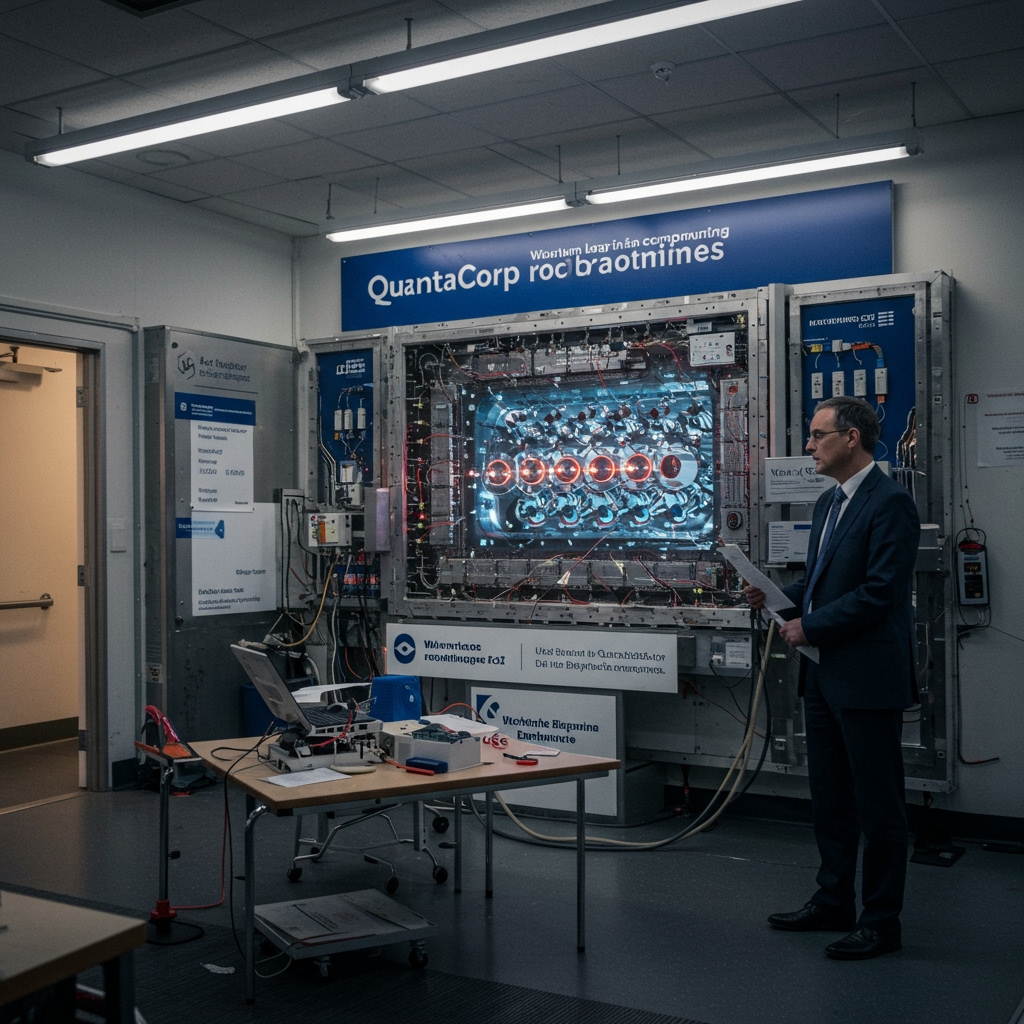QuantaCorp Achieves Landmark Quantum Computing Breakthrough
QuantaCorp, a leading innovator in the field of quantum computing, today announced a monumental achievement with the successful demonstration of a stable 256-qubit quantum processor. This development marks a significant leap forward in the practical application of quantum computing, particularly for tackling complex scientific and industrial challenges. The company confirmed that the new processor exhibits unprecedented stability and boasts impressively low error rates, measured at consistently below 0.1%. This level of performance represents a critical milestone for moving quantum computing beyond theoretical concepts and into tangible problem-solving capabilities.
The technical details and validation of this breakthrough were prominently featured as a cover story in the prestigious scientific journal Nature, with the issue published on January 15, 2025. Publication in Nature underscores the scientific rigor and significance of QuantaCorp’s accomplishment, validating its impact on the global research community. The article details the processor’s architecture, the methodologies used to achieve such high stability, and the rigorous testing protocols that confirmed the sub-0.1% error rate – a benchmark previously considered aspirational for processors of this scale.
Surpassing Previous Benchmarks
This newly unveiled 256-qubit system from QuantaCorp sets a new standard within the rapidly evolving quantum computing landscape. The company highlighted that the processor successfully surpasses benchmarks previously established by competitors by nearly double the qubit count. Furthermore, the reported error rate of below 0.1% is significantly lower than those observed in comparable systems, addressing one of the most persistent challenges in scaling quantum computers: maintaining coherence and minimizing computational errors across a larger number of qubits. This combination of scale and accuracy is what makes QuantaCorp’s breakthrough particularly impactful, paving the way for more reliable and complex quantum computations.
Scaling quantum processors while keeping error rates low is notoriously difficult due to the fragile nature of quantum states. The ability of QuantaCorp’s processor to maintain a stable 256-qubit system with errors below the 0.1% threshold indicates a fundamental advance in quantum hardware engineering and error correction techniques. Experts suggest that reducing error rates is as crucial as increasing qubit count, as it directly impacts the length and complexity of algorithms that can be reliably executed on a quantum computer. A lower error rate means that quantum computations can run for longer periods and involve more gates before errors accumulate to render the results unreliable. QuantaCorp’s success on this front is therefore a major enabler for practical quantum applications.
Accelerating Complex Simulations and Drug Discovery
The immediate and most promising application for this advanced quantum processor lies in its capacity to accelerate complex simulations. Many scientific and industrial problems, particularly those involving the behavior of molecules, materials, and chemical reactions, require computational resources that exceed the capabilities of even the most powerful classical supercomputers. Quantum computers are uniquely suited for such simulations because they can potentially model the quantum mechanical nature of these systems directly.
QuantaCorp’s stable 256-qubit processor is expected to significantly reduce the computational time required for these intricate tasks. The company specifically highlighted the profound implications for drug discovery. The process of identifying, developing, and testing new pharmaceutical compounds is incredibly time-consuming and expensive, often taking over a decade from initial research to market. A major bottleneck is the need to simulate how potential drug molecules will interact with biological targets within the body. Classical computers can only approximate these interactions for relatively small molecules.
By leveraging the power of the new QuantaCorp processor, researchers will be able to perform more accurate and extensive simulations of molecular interactions. This could dramatically speed up the identification of promising drug candidates, optimize their properties, and predict their efficacy and potential side effects with greater precision. QuantaCorp estimates that this acceleration of complex simulations, particularly in the realm of molecular modeling and materials science, has the potential to reduce drug discovery timelines by years, bringing life-saving therapies to market much faster.
Strategic Partnership with BioPharma Solutions
The potential impact of QuantaCorp’s breakthrough on the pharmaceutical industry is already being recognized. Concurrent with the announcement of the new processor, QuantaCorp revealed that it has signed a multi-year research partnership with BioPharma Solutions, a globally recognized pharmaceutical giant. This strategic collaboration is set to leverage QuantaCorp’s cutting-edge quantum computing capabilities to tackle some of BioPharma Solutions’ most challenging research and development problems.
Under the terms of the multi-year agreement, BioPharma Solutions researchers will gain access to QuantaCorp’s 256-qubit processor and its team of quantum scientists. The partnership will focus on applying quantum simulations to accelerate specific aspects of BioPharma Solutions’ drug discovery pipeline, potentially including target identification, lead optimization, and predictive toxicology. This collaboration is a strong validation of the commercial viability and practical relevance of QuantaCorp’s quantum hardware and represents a significant step towards the integration of quantum computing into mainstream industrial R&D processes.
Industry Outlook and Future Direction
QuantaCorp’s achievement arrives at a pivotal moment for the quantum computing industry. While other companies have made significant strides in increasing qubit counts, maintaining high fidelity (low error rates) across a large number of qubits remains a significant hurdle. QuantaCorp’s success in demonstrating a stable 256-qubit processor with an error rate below 0.1% distinguishes it from competitors and positions the company as a frontrunner in delivering practical, fault-tolerant quantum systems.
The partnership with BioPharma Solutions underscores a growing trend of major corporations exploring and investing in quantum computing to gain a competitive edge. Experts predict that as quantum hardware continues to improve, industries ranging from pharmaceuticals and materials science to finance and logistics will begin to see the transformative impact of this technology.
QuantaCorp indicated that this 256-qubit processor is a stepping stone towards even larger and more powerful systems. The company plans to continue scaling its hardware while refining its error correction techniques. The success detailed in Nature and the strategic partnership with BioPharma Solutions provide a strong foundation for QuantaCorp’s future endeavors in making quantum computing a practical tool for solving humanity’s most challenging problems.





